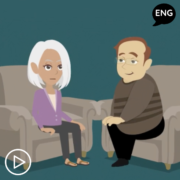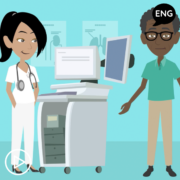Tools for Accessing Quality Prostate Cancer Care
Tools for Accessing Quality Prostate Cancer Care from Patient Empowerment Network on Vimeo.
What factors could impact a prostate cancer patients access to quality, affordable care? This animated video reviews common obstacles and provides tools and resources to help address barriers to care.
See More From Shared Decision Making: Navigating Prostate Cancer Care
Related Resources:

|

|

|
Transcript:
Anthony:
Hi! I’m Anthony, and I’m living with advanced prostate cancer. This is Niki, my nurse.
Just like prostate cancer doesn’t behave the same way in every patient, each prostate cancer patient has different factors that could impact their access to quality, affordable care.
Niki:
Exactly, Anthony. There are obstacles that may affect their potential to manage their cancer.
These barriers, which are also called health disparities1, are complex and may include things like:
- Not having health insurance – or having limited insurance.
- Experiencing racism and discrimination.
- Language barriers if English is not the language you are most comfortable with2.
- Cultural barriers.
- Experiencing financial constraints.
- A lack of sick time or paid time off in the workplace.
- Living in a remote or rural area with limited access to care.
- Or, a lack of education or health literacy.
Anthony:
And overcoming or addressing these barriers is the goal of health equity.
Niki:
Right! EVERYONE should have the access to quality care. And while it isn’t possible to solve these problems overnight, there are resources and support services to help people with prostate cancer. It is important to identify and to discuss your barriers with your healthcare team as they are unique to each individual patient.
Anthony:
First and foremost, as we’ve mentioned in prior videos – don’t hesitate to speak up if you feel you are receiving unequal care. You can consider changing doctors if you don’t feel you’re receiving fair treatment, or if you’re not comfortable with your team.
But the burden to access better care shouldn’t fall on you. Your team is there to help, right, Niki?
Niki:
That’s what they are there for! And the best place to start is by reaching out to a nurse navigator or social worker on your team. They may work with you and identify any challenges in your way and offer support resources to guide you in the right direction.
Anthony:
Exactly – my social worker helped me find an organization that provided transportation to and from my treatment appointments.
Niki, are there other services that a nurse navigator or social worker help you connect with?
Niki:
Absolutely – let’s walk through some examples:
- There are resources that can help with the financial strain of cancer care. Patient assistance programs are in place for people who don’t have health insurance or who are underinsured. They are managed by government agencies, pharmaceutical companies, and advocacy groups; and, in some cases, these programs can help cover the cost of medications or provide them at a discounted rate.
- Team members who provide emotional support are available to help you such as a social worker, counselor, therapist, or psychologist.
- If language is a barrier, translators can be made available to join appointments with you, so you can actively participate in your care discussions and decisions. And you can ask for materials in the language you are most comfortable with.
- And if your job is affecting your ability to get care, many advocacy groups have resources that can support you in advocating for your rights in the workplace.
Anthony:
Those are all wonderful support services, Niki.
I also want to add that if you are having trouble understanding your disease, advocacy groups have excellent materials in patient-friendly language. Download the guide that accompanies this video for a list of recommended organizations.
Niki:
That’s right. And, many medical centers have patient advocates available to help you communicate with your team, so you can get the care you need and feel confident in your decisions. Remember, you are not alone!
We hope this video helped you feel more empowered to ask for resources. Thanks for joining us!
Anthony:
And visit powerfulpatients.org/pc to access more videos with Niki and me.










